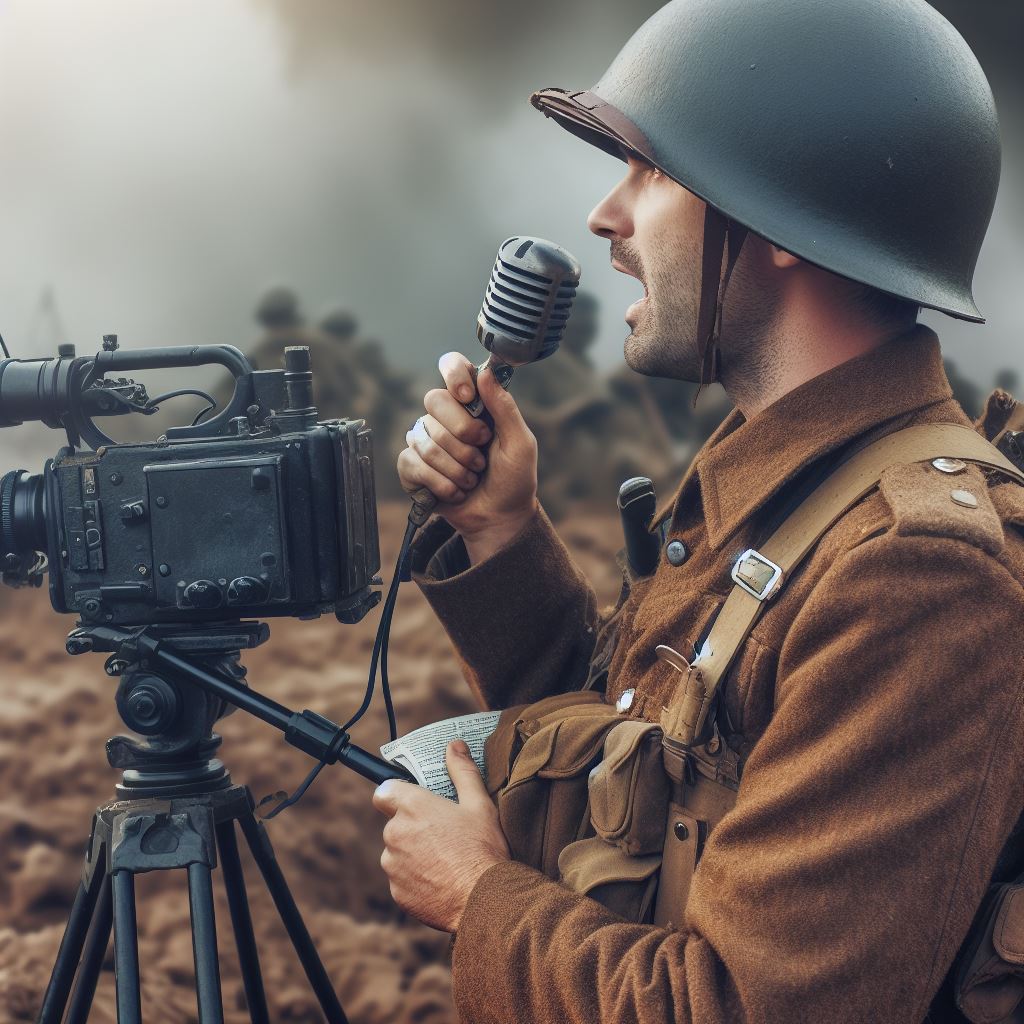Introduction
War correspondents play a vital role in reporting events and bringing news from the frontlines.
Canadian war correspondents have made significant contributions to journalism and the country’s history.
Thesis statement
This blog section will delve into the untold stories of Canadian war correspondents.
War correspondents have always been essential figures in the coverage of conflicts, providing firsthand accounts and insights into the realities of war.
Canadian war correspondents, in particular, have played a crucial role in documenting historical events and shed light on the Canadian military’s involvement.
These brave journalists faced immense dangers and challenges, putting their lives at risk to bring news to the public.
Their stories often go unnoticed or forgotten amidst the chaos and intensity of war.
This blog section aims to explore and bring to light some of these untold stories, highlighting the heroic actions, sacrifices, and unique experiences of Canadian war correspondents.
By examining the untold stories of Canadian war correspondents, we can gain a deeper understanding of the impact of their work and the importance of journalism in the context of war.
Through their reporting, these correspondents not only kept the Canadian public informed but also provided a voice to those serving in the military.
Their accounts allowed the public to empathize with the soldiers’ experiences and gain a more comprehensive perspective on the realities of war.
In the sections that follow, we will dive into the captivating stories and extraordinary achievements of Canadian war correspondents throughout history, each one contributing to the rich tapestry of Canadian journalism and the nation’s military heritage.
The role of Canadian war correspondents
Describing the responsibilities and challenges they face
Canadian war correspondents have the responsibility of reporting on the frontlines of conflicts.
They face numerous challenges, such as personal safety risks, trauma, and emotional toll.
These correspondents immerse themselves in dangerous situations to bring news from war zones.
They must navigate restricted access, censorship, and the constant threat of violence.
Their duty is to provide accurate, timely, and unbiased accounts of the realities of war.
Highlighting the importance of their role in informing the public
War correspondents play a vital role in keeping the public informed about conflicts. They bridge the gap between the war zone and those who seek information.
Their firsthand reporting provides a deeper understanding of the human impact of war. By sharing stories, they create empathy and raise awareness of global events.
Without their efforts, the public would rely solely on official statements or biased sources.
Discussing their contribution to Canadian history and identity
Canadian war correspondents have made significant contributions to the nation’s history.
Through their reporting, they document the bravery and sacrifices of Canadian soldiers.
Their narratives contribute to the collective memory and understanding of wartime experiences.
They shape Canada’s identity as a nation willing to participate and engage in global affairs.
War correspondents amplify the voices of those affected by war, ensuring their stories are heard.
Unlock Your Career Potential
Visualize a clear path to success with our tailored Career Consulting service. Personalized insights in just 1-3 days.
Get StartedRead: Grants & Funding for Canadian Writers
The forgotten heroes: Canadian war correspondents from WWI
Introducing key Canadian war correspondents during WWI
- Frederick James Cecil Menzies was a prominent war correspondent during WWI.
- He reported extensively on the Canadian Expeditionary Force’s experiences on the Western Front.
- Menzies provided vivid descriptions of the brutal conditions and the soldiers’ heroism.
- His reports played a crucial role in shaping Canadian public opinion on the war.
- Another notable correspondent was Beatrice Helen Nasmyth, who wrote under the pen name “Kit Coleman.”
- Coleman was one of the few female war correspondents at the time and covered the war with great courage.
- Her articles focused on the sacrifices made by Canadian soldiers and their families.
- Other renowned war correspondents included William Boyd and Agnes Maule Machar.
- Boyd’s dispatches highlighted the Canadian troops’ achievements, boosting morale back home.
- Machar’s writings conveyed the emotional toll of war on soldiers and those left behind.
Sharing their experiences and stories from the frontlines
- Canadian war correspondents faced numerous challenges while reporting from the frontlines.
- They witnessed the horrors of trench warfare, the devastating effects of artillery bombardments, and the loss of comrades.
- Despite these hardships, they felt a responsibility to convey the truth to the Canadian public.
- Many correspondents developed strong bonds with the soldiers, sharing their triumphs and tragedies.
- Menzies, for instance, formed close relationships with several soldiers, which allowed him to provide authentic accounts.
- Coleman and other correspondents also emphasized the stories of ordinary soldiers, highlighting their bravery and sacrifices.
- Their objective was to bring the war closer to home and ensure that the soldiers’ experiences were not forgotten.
Discussing the impact of their reporting on Canadian society
- Canadian war correspondents played a crucial role in shaping public opinion and the perception of the war.
- Through their vivid and often heartbreaking reports, they humanized the war for Canadians.
- They exposed the reality of trench warfare and the toll it took on soldiers physically and mentally.
- The correspondents’ stories also shed light on the sheer scale of sacrifice made by Canadian troops.
- Their reporting instilled a sense of national pride and unity among Canadians on the home front.
- Additionally, the war correspondents’ work helped dispel misconceptions and propaganda about the war.
- They provided a more accurate portrayal of the conflict, ensuring a better understanding among the public.
- Their contribution to shaping public opinion during WWI should not be underestimated.
- These forgotten heroes risked their lives to bring the truth to Canadians and honor the soldiers who fought.
In summary, the Canadian war correspondents of WWI, such as Menzies, Coleman, Boyd, and Machar, played a significant role in reporting the realities of war.
Their experiences on the frontlines and their powerful storytelling shaped public opinion, humanizing the war for Canadians.
Through their reporting, they showcased the sacrifices made by Canadian soldiers and provided an authentic account of the conflict.
We must not forget these forgotten heroes, who risked everything to ensure that the stories of the soldiers were told and never erased from the pages of history.
Read: Creative Writing Degrees in Canada: Worth It?
Canadian war correspondents in WWII and the Korean War
Introducing notable war correspondents from WWII and the Korean War
During World War II and the Korean War, Canadian war correspondents played a crucial role in reporting from the frontlines.
These brave journalists risked their lives to bring news and stories that would inform and shape public perception of these conflicts.
One notable war correspondent from WWII was Ross Munro.
He served as a correspondent for the Canadian Press and later became a founding member of the newspaper chain Southam News.
Munro reported extensively on the major battles of WWII, including the Normandy landings, the Liberation of Holland, and the Battle of the Scheldt.
Another remarkable journalist was Matthew Halton.
As a radio correspondent for the CBC, Halton covered the horrors of war in Europe. He provided vivid descriptions of the Blitz, the liberation of Paris, and the fall of Berlin.
Halton’s insightful reporting made him a household name in Canada and earned him international recognition.
Moving on to the Korean War, Peter Stursberg emerged as an influential war correspondent.
Serving as a reporter for the CBC, Stursberg was among the first Canadians to cover the conflict.
He risked his life by accompanying Canadian troops to the frontlines, providing the public with firsthand accounts of the war’s brutality.
Highlighting their stories and contributions during these conflicts
These war correspondents not only reported on the battles and events but also humanized the conflicts.
Through their stories, they shed light on the sacrifices and bravery of the soldiers fighting in these wars.
Ross Munro, for instance, captured the harrowing experiences of Canadian soldiers as they faced heavy resistance during the Battle of the Scheldt.
His detailed accounts ensured that the public understood the tremendous toll of war on the troops.
Matthew Halton, with his radio reports, brought home the chaos and devastation of WWII.
His coverage of the D-Day landings allowed Canadians to understand the significance of this pivotal moment in history.
Peter Stursberg provided a glimpse into the harsh reality faced by Canadian troops during the Korean War.
His reports from the frontlines revealed the daily struggles and sacrifices made by soldiers in a conflict far from home.
Discussing the challenges they faced and the marked increase in media censorship during WWII
Despite their important contributions, war correspondents faced numerous challenges, particularly during WWII.
One significant obstacle was the increasing censorship imposed by military authorities.
During WWII, military censors carefully monitored journalists’ reports to ensure that sensitive information did not reach the enemy.
This censorship limited the amount of information war correspondents could send back home, making it difficult for the public to truly understand the full nature of the conflicts.
Moreover, war correspondents had to work under constant threat to their lives.
They faced the same dangers as the soldiers they reported on, often witnessing horrific violence and destruction firsthand.
The need to balance their duty to report with personal safety was a constant struggle.
In fact, Canadian war correspondents played a vital role in shaping the Canadian public’s understanding of WWII and the Korean War.
These journalists risked their lives to bring stories from the frontlines, giving voice to the soldiers and capturing the true essence of these conflicts.
Despite the challenges they faced, their contributions remain a testament to the power of journalism in times of war.

Modern-day Canadian war correspondents
Exploring the changes and advancements in war reporting
War reporting has rapidly evolved over the years, driven by advancements in technology and the rise of social media.
Modern-day Canadian war correspondents are at the forefront of these changes, bringing untold stories to a global audience.
- Enhanced Access: Unlike their predecessors, modern war correspondents have unparalleled access to conflict zones. Improved transportation networks and communication infrastructure enable them to reach remote areas, providing firsthand accounts of war.
- Multi-Media Reporting: Contemporary war correspondents utilize an array of multimedia tools to convey the realities of war. They capture photos, record videos, and write detailed articles, helping the audience get a comprehensive understanding of the conflict.
- Collaborating with Local Journalists: Canadian correspondents often team up with local journalists to gain a deeper understanding of the conflict. Through these collaborations, they obtain insights and perspectives that may be otherwise overlooked.
- Ethical Challenges: The digital age has brought its own set of ethical challenges. Journalists must navigate the fine line between reporting sensitive information and ensuring the safety of those involved in the conflict.
Profile a few contemporary Canadian war correspondents and their experiences
- Sally Marshall: A seasoned war correspondent, Sally has covered conflicts in various parts of the world. Her dedication to revealing untold stories has earned her several accolades and the respect of her peers.
- Mark Evans: Mark has reported from war-torn regions, highlighting the human impact of conflict. He uses his platform to amplify the voices of civilians affected by war, shedding light on their struggles.
- Maya Singh: Maya’s unique perspective as a war correspondent from an immigrant background brings a fresh outlook to her reporting. Her experiences and cultural insights enrich her storytelling.
Discussing the impact of technology and social media on war reporting
- Real-Time Reporting: Thanks to technology, war correspondents can provide real-time updates from the front lines. Live videos, tweets, and blog posts allow the audience to experience the intensity of war as it unfolds.
- Amplification of Voices: Social media platforms give war correspondents the power to share stories that might have otherwise been ignored or silenced. This amplification helps raise awareness and promotes accountability.
- Information Overload: With the abundance of information available, war correspondents must sift through vast amounts of data to provide accurate and reliable reports. Verification becomes crucial in avoiding misinformation.
- Citizen Journalism: Social media has empowered citizens to become journalists themselves, documenting conflicts from their own perspectives. This democratization of news brings both opportunities and challenges for professional war correspondents.
- Safety Concerns: While technology and social media enhance war reporting, they also increase safety concerns. Journalists must be cautious about their digital footprint, as it can jeopardize their safety and the safety of those they work with.
In short, modern-day Canadian war correspondents have embraced advancements in technology and social media to shed light on untold stories.
They navigate ethical challenges, collaborate with local journalists, and utilize multimedia tools to provide comprehensive coverage.
The impact of their work is amplified through social media, bringing the reality of war closer to audiences worldwide.
Read: Self-Publishing in Canada: A Comprehensive Guide
Explore Further: The Canadian Artist’s Guide to Gallery Representation
Recognizing the sacrifices and the need for commemoration
Discussing the dangers faced by war correspondents
- War correspondents risk their lives to report on conflicts and provide vital information.
- They face the constant threat of physical harm from bullets, shelling, and explosions.
- Being on the front lines, war correspondents are exposed to unpredictable and life-threatening situations.
- They often work in war zones where there is no guarantee of safety or protection.
- Dangers not only come from enemy fire but also from accidents, friendly fire, and unexploded ordnance.
- War correspondents must navigate through hazardous environments, including damaged buildings and hostile territories.
- The risks they undertake are unparalleled, as they aim to shed light on the realities of war.
Highlighting the psychological toll on their mental health
- War correspondents not only face physical dangers but also endure immense psychological stress.
- Witnessing violence, death, and human suffering can lead to severe emotional trauma.
- The constant exposure to traumatic events can cause post-traumatic stress disorder (PTSD).
- Many war correspondents struggle with anxiety, depression, and recurring nightmares.
- Coping with survivor’s guilt is common among those who witness others getting injured or killed.
- The demanding nature of their work leaves little time for self-care, exacerbating mental health issues.
- It is crucial to raise awareness about the psychological toll on war correspondents and provide necessary support.
Exploring initiatives and organizations that support war correspondents
- Various initiatives and organizations exist to assist and protect war correspondents in their challenging work.
- The Rory Peck Trust offers assistance to freelancers working in conflict zones, providing financial and legal aid.
- Reporters Without Borders advocates for press freedom and provides support to journalists facing persecution.
The Dart Center for Journalism and Trauma offers resources and training on trauma reporting and self-care. - International News Safety Institute provides safety courses and resources to enhance journalists’ safety skills.
- Non-profit organizations like Frontline Freelance Register and Committee to Protect Journalists advocate for journalists’ rights.
- Governments and media organizations should continue to invest in programs that prioritize the safety and well-being of war correspondents.
Basically, war correspondents make remarkable sacrifices to deliver news from conflict zones.
They face extreme dangers, risking their lives to bring vital information to the public.
These individuals also endure significant psychological tolls due to witnessing traumatic events.
Initiatives and organizations play a vital role in supporting them and ensuring their safety.
Recognizing their sacrifices and commemorating their contributions is essential to honor their courage and dedication.
Read: Documentary Directing: A Focus on Canada
Conclusion
Canadian war correspondents have left an indelible mark on history:
- Their contributions are vital, capturing the essence of wartime experiences.
- Remembering and honoring their sacrifices ensures their legacy endures.
- These untold stories deserve recognition and appreciation for their invaluable service.
In the end, let’s acknowledge the bravery and dedication of Canadian war correspondents.
Remembering their sacrifices is not just a duty but a source of inspiration.
As we reflect on their untold stories, it is a call to action for further research and a commitment to appreciate the profound impact these journalists had on shaping our understanding of war.
Their narratives live on, urging us to delve deeper into their stories and ensure their significant role in history is never forgotten.




